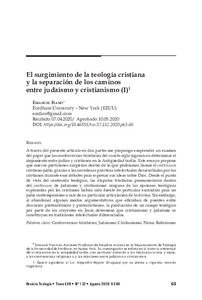Por favor, use este identificador para citar o enlazar este ítem:
https://repositorio.uca.edu.ar/handle/123456789/10546| Título: | El surgimiento de la teología cristiana y la separación de los caminos entre judaísmo y cristianismo The emergence of theology and the parting of the ways abstract |
Autor: | Flano, Emanuel | Palabras clave: | TRINIDAD; JUDAISMO; CRISTIANISMO; HISTORIA DE LA RELIGION; TEOLOGIA TRINITARIA | Fecha de publicación: | 2020 | Editorial: | Pontificia Universidad Católica Argentina. Facultad de Teología | Cita: | Flano, E. El surgimiento de la teología cristiana y la separación de los caminos entre judaísmo y cristianismo [en línea]. Teología. 2020, 57 (132). doi:10.46553/teo.57.132.2020.p63-86. Disponible en: https://repositorio.uca.edu.ar/handle/123456789/10546 | Resumen: | Resumen: través del presente artículo en dos partes me propongo emprender un examen del papel que las controversias trinitarias del cuarto siglo jugaron en determinar el alejamiento entre judíos y cristianos en la Antigüedad tardía. Este ensayo propone que nuevas particiones surgieron dentro de lo que podríamos llamar el continuum cristiano-judío, gracias a las novedosas prácticas intelectuales desarrolladas por los cristianos durante esos debates para expresar sus ideas sobre Dios. Desde el punto de vista del contenido teológico, las disputas trinitarias permanecieron dentro del continuum de judaísmo y cristianismo: ninguna de las opciones teológicas exploradas por los cristianos habría sido fuente de particular escándalo para un judío contemporáneo a raíz de su particular articulación de lo divino. Sin embargo, al abandonar algunos modos argumentativos que oficiaban de puentes entre discursos protorabínicos y protocristianos, la producción de un campo teológico por parte de los creyentes en Jesús determinó que cristianismo y judaísmo se constituyan en tradiciones intelectuales diferenciadas. Abstract: With this article in two parts I hope to open up an examination of the role played by the fourth-century Trinitarian controversies in the late ancient estrangement between Jews and Christians. The article proposes that new partitions emerged in Judaeo-Christianity thanks to the novel practices that during the Trinitarian controversies Christians developed to express their ideas about God. From the viewpoint of theological content, the Trinitarian disputes persisted within a lasting Christian-Jewish continuum: none of the theological options explored by Christians would have caused particular scandal to a contemporaneous Jew on account of its particular articulation of divine reality. Nevertheless, by disengaging from earlier modes of argumentation functioning as bridges between proto-rabbinic and proto- Christian discourses, the production of a theological field on the part of believers in Jesus was largely responsible for the separate constitution of Christianity and Judaism as intellectual traditions. |
URI: | https://repositorio.uca.edu.ar/handle/123456789/10546 | ISSN: | 0328-1396 (impreso) 2683-7307 (online) |
Disciplina: | TEOLOGIA | DOI: | 10.46553/teo.57.132.2020.p63-86 | Derechos: | Acceso abierto | Fuente: | Teología. Tomo 57, No.132, 2020 |
| Aparece en las colecciones: | TEO - 2020 Tomo LVII nro. 132 |
Ficheros en este ítem:
| Fichero | Descripción | Tamaño | Formato | |
|---|---|---|---|---|
| surgimiento-teologia-cristiana-separacion.pdf | 787,1 kB | Adobe PDF |  Visualizar/Abrir |
Visualizaciones de página(s)
508
comprobado en 30-abr-2024
Descarga(s)
826
comprobado en 30-abr-2024
Google ScholarTM
Ver en Google Scholar
Altmetric
Altmetric
Este ítem está sujeto a una Licencia Creative Commons

